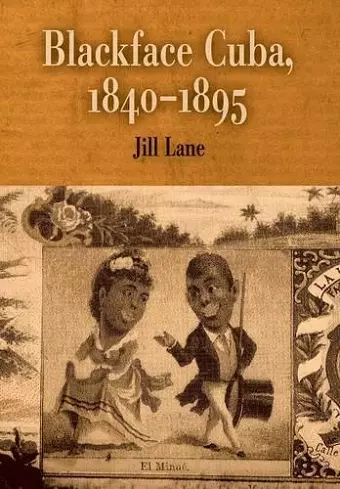Blackface Cuba, 1840-1895
Format:Hardback
Publisher:University of Pennsylvania Press
Published:22nd Jun '05
Currently unavailable, and unfortunately no date known when it will be back

Blackface Cuba, 1840-1895 offers a critical history of the relation between racial impersonation, national sentiment, and an anticolonial public sphere in nineteenth-century Cuba.
Blackface Cuba, 1840-1895 offers a critical history of the relation between racial impersonation, national sentiment, and the emergence of an anticolonial public sphere in nineteenth-century Cuba. Through a study of Cuba's vernacular theatre, the teatro bufo, and of related forms of music, dance, and literature, Lane argues that blackface performance was a primary site for the development of mestizaje, Cuba's racialized national ideology, in which African and Cuban become simultaneously mutually exclusive and mutually formative.
Popular with white Cuban-born audiences during the period of Cuba's anticolonial wars, the teatro bufo was celebrated for combining Spanish elements with supposedly African rhythms and choreography. Its wealth of short comic plays developed a well-loved repertory of blackface stock characters, from the negrito to the mulata, played by white actors in blackface. Lane contends that these practices were embraced by white audiences as especially national forms that helped define Cuba's opposition to Spain, at the same time that they secured prevailing racial hierarchies for a future Cuban nation. Comparing the teatro bufo to related forms of racial representation, particularly those created by black Cubans in theatres and in the press, Lane analyzes performance as a form of social contestation through which an emergent Cuban national community struggled over conflicting visions of race and nation.
"Blackface performance, treated in U.S. scholarship as if it were an exclusively national phenomenon, has not until now been the subject of an extended study for Cuba, where it was the main vehicle for shaping a sense of hybridity. Lane shows that performance reiterated the contradiction between blacks and whites while trying to overcome it. From acting up to impersonation, Lane links some liberating practices of anticolonialism in the Americas with the binding mechanisms for a new national unity." * Doris Sommer, Harvard University *
"A valuable source on nineteenth-century Cuban cultural manifestations. Highly recommended." * Choice *
ISBN: 9780812238679
Dimensions: unknown
Weight: unknown
288 pages